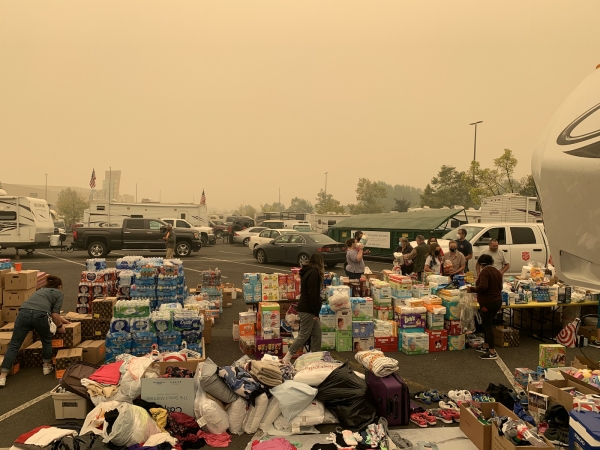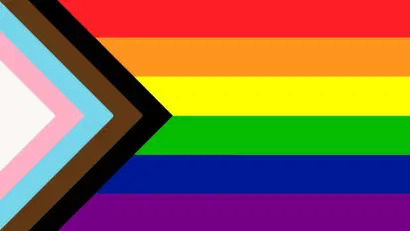Forgive Like The End is Near

Sermon for September 13, 2020
The Rev. Matthew David Morris
“Repent,” says John the Baptist at the start of this Gospel of Matthew, “Repent, for the kingdom of heaven is near.”
“The time is fulfilled,” Jesus says at the start of the Gospel of Mark. "The kingdom of God is near; repent and believe in the good news.”
The end is near. Heaven is close. Time is fulfilled.
This is the eschatological backdrop for the good news of Jesus Christ, and if we don’t take a moment to unpack what “eschatological backdrop” means, we will miss the urgency behind today’s Gospel reading, in which we are told to forgive not 7 times, but 77.
Eschatology is the “Study of last things,” according to the Westminster Dictionary of Theological Terms. It is the study of the end of the world.
There are few things more out of vogue to talk about in liberal Christian circles than the end of the world. (Thank you, Kirk Cameron, and your enterprise.) Sin is one of those things we don't like to talk about very often, and I’m afraid I'm going to bring that up today, too.
Sin and the end of the world. That’s what I’ve got for you today. So please, 77 times over, forgive me.
There are many different subsets of eschatology. There is consistent, and cosmic, and futuristic; there is inaugurated and individual; there is NT and OT (which is also called Hebrew Bible, accurately); there is proleptic, and realized, and symbolic, and teleological. All of the 17 letter words. Different types of Eschatology.
And at the end of the end of all things is the Eschaton which, literally, in Greek means, “The last thing.”
Now at this point, you may be saying, “um...why, Father Matthew David, are you talking about the last thing - today, of all days? Why would you invite us to think about all things coming to an end, now?”
Well, here's why:
There is an urgency to the present moment, and an urgency to eschatology, and I think we need to grab hold of that urgency, as a community, today.
“Don’t waste a good crisis,” it is said, on the internet, that Winston Churchill said during WWII. I don't know if he did; it's what the internet says. But I like the sentiment: don’t squander those feelings of urgency that arise as the sky turns yellow, or orange, or grey from wildfire smoke, and some half-a-million people are displaced under some state evacuation order – 1, 2, 3 – and we all have absolutely no idea what's going to happen tomorrow.
That feeling of urgency that I'm describing is what informs Jesus’ thoughts on everything; but especially here today, for us, on forgiveness.
We must forgive each other because the kingdom of heaven is near.
We must forgive because the wind could turn and we could be at a Level 3 tomorrow and be on the move. Right?
We must forgive like the end is near and our life depends on it.
And maybe it does.
Now, what I'm not saying here is, "Don't sin because the end is near..." You know, the line of preaching that can lead to the 'damnation talk'. That's not exactly what's happening here.
But sin, that other subject we don’t like to talk about, also has a connection to eschatology; a connection to the end.
Sin is whatever keeps us from getting our heart ready for that very last thing that very last thing that we will all encounter one day. Sin is what gets in the way when what we really need is to get ready for what’s already here.
Sin is the grudge I hold against my neighbor that makes it hard for me to look at them with love and to help them figure out how to be safe when we’re surrounded by wildfire.
Sin, Paul says in Romans, is whether you eat meat or your a vegetarian in the midst of a natural disaster. That's what we're talking about here.
Sin is the stumbling block I’ve laid down – some snarky remark or the selfish action – that we all trip over as we’re getting our Go-bags with the things that we may need for the journey ahead.
If the end is blowing our way in the wind, sin keeps me oblivious to the smoke; distracted and unable to make the best next choice.
Sin is whatever diminishes my capacity to love you and to love God.
Now, hearing this word "sin" over, and over, and over again... Heading me talk about it and then talk about the end of the world This talk of sin and the end of the world... This may not seem very nuanced to you, and may be off putting. Maybe you think about the fire and brimstone preacher from your past who took every opportunity to shake you in your pews and wrongly convict you, or damn you, or shame you, or blame you.
I’m not here to do any of that. That is not what this is about.
This is just your friendly neighborhood priest telling you, as gently as I can, something you already know: that the world is on fire (because it is) and we don’t have time to be bitter with one another. We don't have time to be spiteful toward one another.
If we’re going to make it through this, we have to forgive.
And I say all of this knowing full well how hard it is. I say this knowing how it feels to hold onto a grudge like it’s a set of prayer beads, convincing myself that if I just clutch it tighter it will eventually yield me a blessing.
Peter knew it was hard to forgive, which is why he asked, "How many times do I have to do this?"
“As many times as it takes,” Jesus, in essence, replies, “to forgive your way to the end.”
Forgive with the urgency that the climate crisis demands. And do so even when the skies turn blue. Let go of that sinful grudge against your neighbor even after the rains come back and the green returns and we forget what it feels like to be this close – only miles away from a raging inferno.
Christianity is a path that has an end. We proclaim it. We name it. It is woven into our liturgical language. It is in our sacred stories of scripture. We may not like to talk about it, but Jesus certainly did. And so did Paul. And so did John the Baptist. It is woven into our identities.
And what we say about the end that I hope gives hope in a moment where it feels hard to hold onto....
And I'm going to, as your priest, be the first one to name it: it's a confusing and challenging thing to preach about hope when you might not, yourself, feel a whole lot of it...
but what we proclaim, as Christians, is the hope that at that at the end of the end, where all things end, Jesus is there. The Word. The One who was there before all creation. The One who breathed you into being. The One who loves you something silly. That at the end of it all is this loving Christ.
So, we have no idea when that end will come, just like we have no idea when these fires will subside. But what we can do now is remember who's at the end of all this; who is on the other side of the fire. Who do we proclaim?
I invite you to answer that question in the language of our prayer, and maybe use this time of urgency as a practice run for the eschaton.
Forgive like your very life – like your very salvation – and that of your neighbor, depend on it.
In the name of God, Father, Son, and Holy Spirit. Amen.
Tags: Sermons
